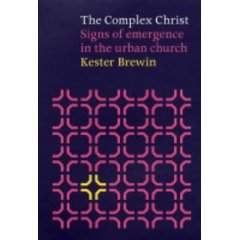This week I’ve been re-reading a book by Kester Brewin of The Vaux Community in London, England, The Complex Christ: Signs of Emergence in the Urban Church.
I want to share a few thoughts from the chapter on “Gift.” These are direct quotes from the book. I encourage you to purchase the book from Amazon.com by clicking on the book cover to the left. I cannot say that I am in total agreement with all that he writes in this book, but once again, it has impacted my life and ministry.
Christ began his journey to embrace the city in the desert, where he rejected the crude transactionalism of those who would tempt him to seek devotees through stunts and bread. He turned away from a style of ministry that tried either to get people to exchange their commitment for the meeting of their material needs, or wow them into belief through displays of power and magic. Christ did this because he had dedicated himself to a new way, to a conjunctive approach to the city. . .
However it is clear that, despite resisting these trades, there was some kind of transaction occurring in Christ’s ministry, just as there is in the Church’s ministry today. Something is given, and something is received. It is vital that we, like Christ, get the nature of this exchange right, for we risk ending up as another product to buy or sensation to seek unless we do… a conjunctive approach to faith must re-evaluate the Church’s modes of exchange, and … central to our critique of consumerism must be the rediscovery of the transaction of gift. (p. 117)
At a basic level then, we might reflect on the extent to which our practices in church function as commodity or gift. . . We must clearly be careful about our gift practices in the context of faith, and ensure that we get the distinction between appropriate commodity transaction and appropriate gift transaction. To blur the line between the two is likely to cause all sorts of problems and lead to allegations of manipulation. (p. 120)
… if worship is a gift, then it is absolutely not about what I am looking to get out of it, but what I am looking to give. Churches must steer clear of ‘selling worship’, as if it could be re-marketed and rebranded through some surface pick-and-mix of popular culture. Who am I to come to worship the Almighty and expect to get something? Yet that’s what most of us do,, turning up tired from the week’s work and busy weekend, needing our batteries recharging, looking for a bit of a power-pack from God or to be caught up in some holy moment. (p. 121)
Churches must aspire to become centres of gift exchange in the broadest sense. They should provide hanging spaces for artists, venues for music of all types, forums for discussions and debates, classes for expectant mothers… whatever gifts there are in the local community, the church should be the place where these gifts can be exchanged or shared. I reiterate: this is not just about services of ‘Christian’ activities. This is about engaging with the local environment and having open boundaries. It is about refusing to see this as infection, but encouraging it as cross-fertilization. It is about declaring our interdependence with the locality we find ourselves in. (p. 128)
My thoughts:
As an artist, as a musician and as a minister of the gospel, my spirit resonates with these thoughts on gift. I believe that too often the church has commercialized its worship, offered assistance to the community with strings attached, or has had a ‘patriarchal’ attitude toward the people groups in the community.
The church must allow people to bring their gifts and share them at all levels of ministry, with no string attached, with no profit expectations, with no analysis to see how many new worship attendees or church members have resulted from the ministry attendance and response.
Jesus wants to reunite us with God because he loves us and longs for an intimate relationship with us. If we are to love others as Jesus loves us, we too must offer such a loving relationship as a gift, without any function or expectation.


 This work is licensed under a
This work is licensed under a
Recent Comments